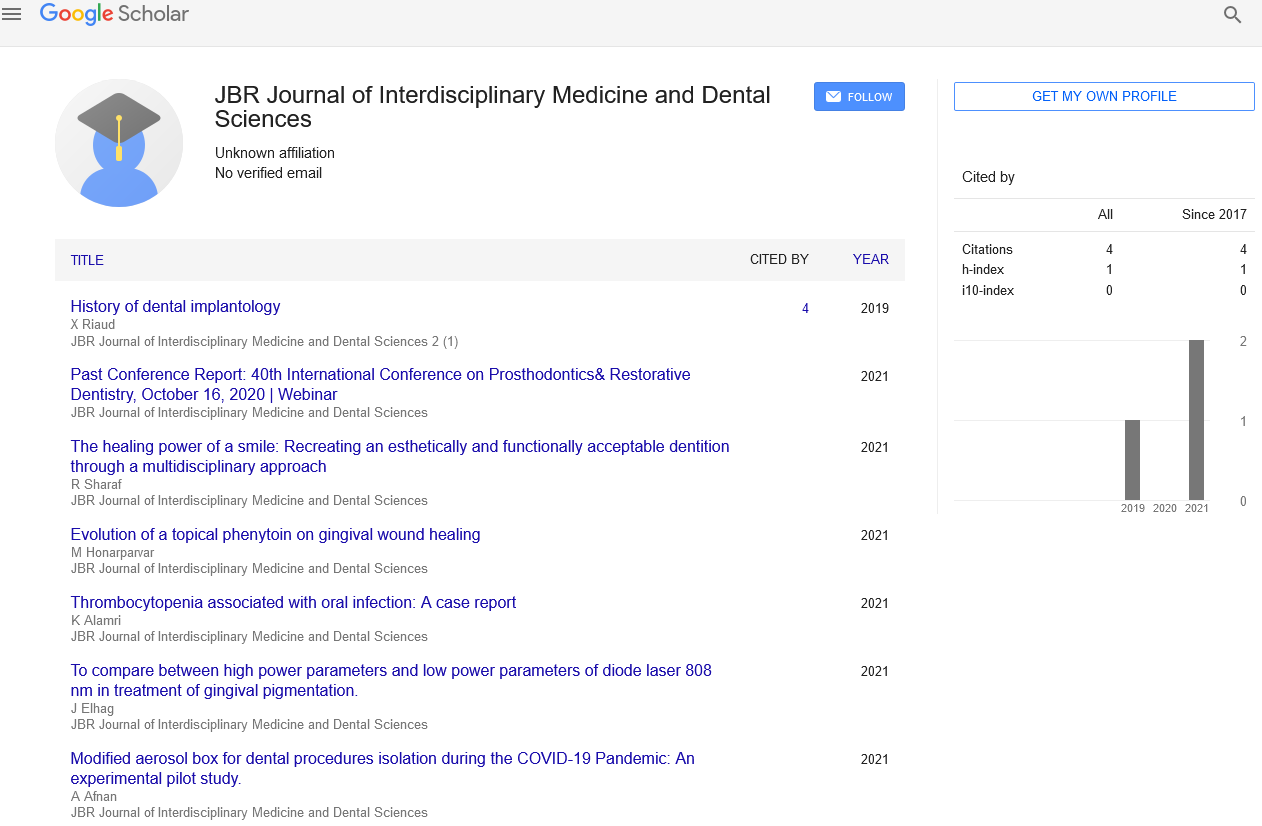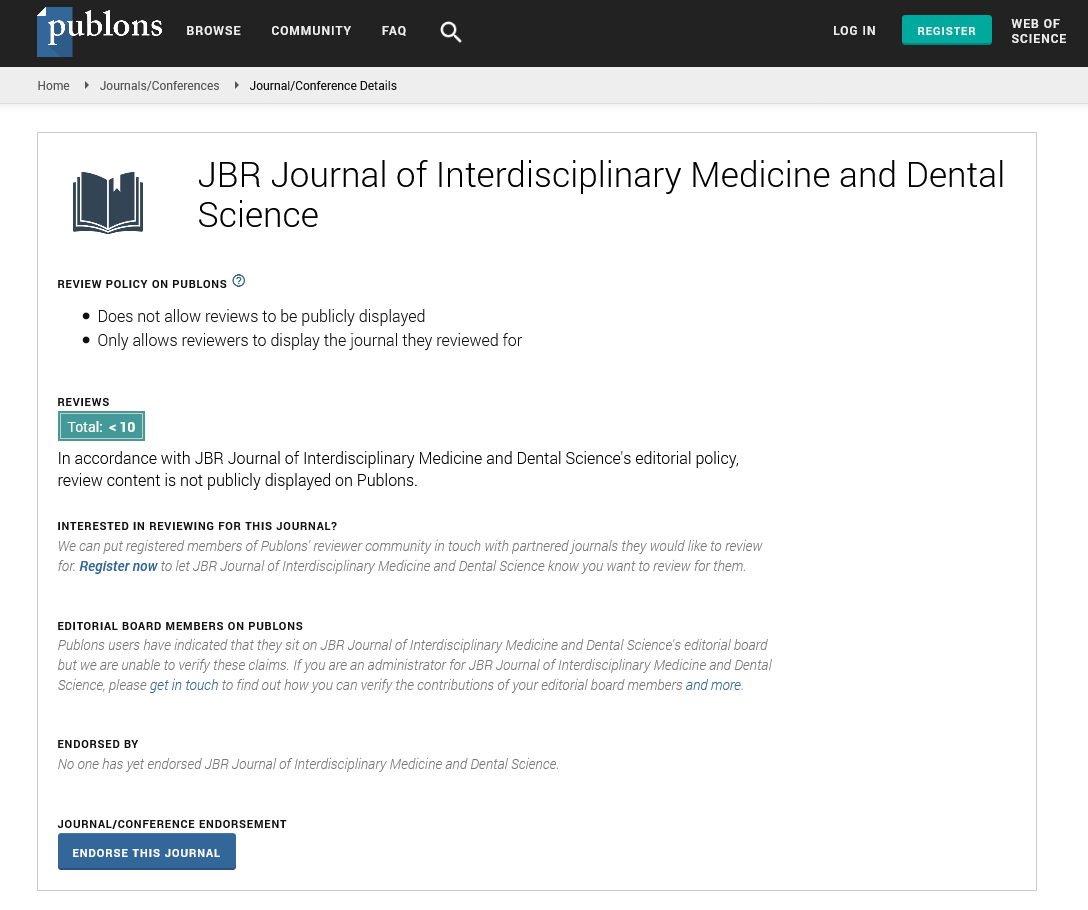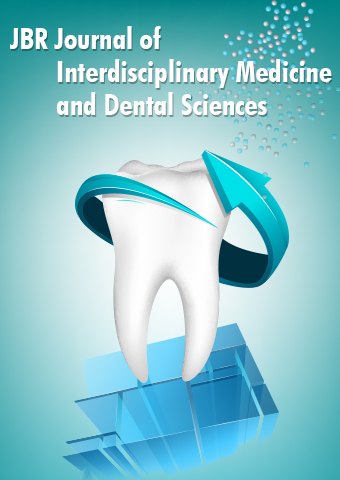Short Communication - JBR Journal of Interdisciplinary Medicine and Dental Sciences (2019) Volume 2, Issue 1
Scope of Natural Products in Combating Renal Disorders
Qazi Zaid Ahmad
Aligarh Muslim University (AMU), India
Abstract
Nephroprotection has acknowledged ample development of late and consists within the measures that defend the excretory organ against several aggressive factors. The thought of nephroprotection in trendy drugs is comparatively new and may hardly be derived before eighties. The advanced nature of nephritic unwellnesss and their progression to renal disorder (both acute and chronic) and finish stage nephritic disease (ESRD) makes its management quite troublesome. The bulk of cases of nephritic unwellness stay unnoticed unless they attain advance stages once the traditional therapeutic interventions are typically not decent to cure them fully. However the most important drawback with uropathy is its progression to a stage once just about no possibility works in the slightest degree except the nephritic replacement medical care (RRT). 2 major elements of RRT viz. qualitative analysis and excretory organ transplantation are extremely subtle and thereby too pricey to be cheap for a median financial gain cluster. Solely tiny chunk of the elite category will take the posh of such a regime subject to the supply of this facility in reach. That’s why most of the patients of uropathy are left to die principally in developing and poor countries attributable to non-availability of RRT facilities in their region or their inability to procure it. Globally, it's been calculable that by a 2010 over 2 million people has been treated by RRT at a value of $1 trillion. Quite one hundred countries worldwide don't have any provision for RRT and consequently, quite 1,000,000 people will be assumed to die once a year from ESRD. Concerning one hundred countries are known that possess no such facility in the slightest degree. Handiness of kidneys for transplantation is another necessary drawback in line with RRT. Although, expenditure on RRT is cost accounting concerning one trillion dollar however the substantial proportion of patients in would like of it, still remains untreated and consequently has out-numbered those receiving the treatment. In 1990 it had been three.78 million and is anticipated to become seven.63 million in 2020. The dread increase within the prevalence of CKD that progresses to finish stage nephritic unwellness requiring nephritic replacement medical care, demands Brobdingnagian fund allocation, additionally, people with excretory organ diseases square measure at associate increasing risk of alternative general diseases which often proves to be fatal. In nut shell so it will be aforesaid that it's nearly next to not possible to supply replacement medical care to all or any patients requiring it. subsequent possibility left with the physicians is to consider alternatives and therefore the best thanks to embark of such a scenario or a minimum of scale down the prevalence and consequently the monetary burden to a major level, is to safeguard the excretory organ perform, slow the progression of unwellness and delay the requirement of RRT.
This second possibility truly sealed the method for envisaging an inspiration that's loosely termed as nephroprotection. This forced the physicians to supposed to adopt some alternate measures to preserve the nephritic perform as long as attainable associated slow the nephritic unwellness progression with an aim to safeguard the excretory organ and delay the requirement of RRT to the most attainable extent. When the experimental demonstration that ACE inhibitors slow the progression of loss of nephritic perform in an exceedingly variety of models of nephritic diseases. It had been for the primary time formed that a treatment strategy will be devised aiming at conserving nephritic perform rather than providing some confirming and passive medical care to the patients of excretory organ diseases. The thought of renoprotection/ nephroprotection so emerged and powerfully stirred up the clinicians to use this idea into apply aiming at early detection and sequent hindrance of progression of uropathy, principally through manner adjustment and therefore the use of recent pharmacologic agents. The nephroprotection includes:
1. Preservation of renal performance as long as possible.
2. Treating the uropathy at the onset/primary stage.
3. Speed the progression of uropathy.
4. Delaying the requirement of RRT to most attainable extent.
A drug can/may ameliorate one in every of the mechanisms or processes mentioned on top of will be used as a very important nephroprotective agent as a result of such associate agent will facilitate within the restoration of excretory organ perform and improvement within the structural impairment of the excretory organ and thereby speed its progression. The mechanisms mentioned on top of cannot be aforesaid but to be completely liable for nephrotoxicity, as a result of many alternative intricacies and sophisticated processes are delineated to be related to the standardisation of excretory organ functions that directly or indirectly influence the hemodynamic of excretory organ. Similarly, some connected pharmacologic effects like drug medication and anti-inflammatory etc. have additionally been shown to enhance the nephroprotection. Few medicines in recent years are found to possess vital nephroprotective impact not withstanding that their mechanism wasn't totally elucidated. Still, they happy the standards of nephroprotection due to their overall effectiveness on nephritic perform. It's being appreciated that ancient systems of medicine offers some effective drugs from their piece of writing to be helpful in numerous pathological conditions of excretory organ and so will be accustomed defend the nephritic perform and prevent/slow the progression of nephritic diseases to CKD or ESRD. Variety of medicine from seasoning sources are shown to possess promising nephroprotective and connected effects in some recent studies and researchers are creating it a degree to concentrate seriously on the event of nephroprotective agents. From ancient sources, Unani System of medicine is additionally not wanting in giving drugs for various excretory organ diseases. It claims to possess variety of medicine that may be used with success within the treatment of nephritic diseases. A number of medicine mentioned in Unani literature and being practiced by physicians, are incontestible to supply some necessary effects like drug, anti-inflammatory, inhibitor & nephroprotective impact against acknowledged toxicants. Some necessary medicine like Bisehri Booti (Aerva lanata, Juss), Revand Chini (Rheum officinalis), Zanjabeel (Zingiber officinale), Asgand (Withania somnifera), Khare khasak (Tribulus terrestris),, Haleela (Terminalia chebula) , Banadequl Buzoor (apoly seasoning formulation), and Jawarish Zarooni Sada (poly seasoning formulation) are investigated for his or her drug and nephroprotective effects.


